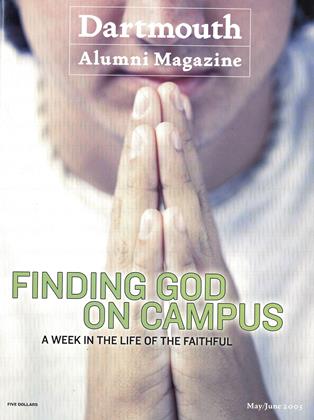QUOTE/OMOUOTE "I knew this was the path I wanted. Despite doing everything possible to convince myself otherwise, putting in my time is what my gut told me I need to do—for both selfish and idealistic reasons." —WAR AND PEACE FELLOW MATTHEW MCKNIGHT '05, WHO WILL BE COMMISSIONED AS A MARINE OFFICER THE DAY BEFORE GRADUATION
WHEN GOVERNMENT PROFESSOR Allan Stam learned two years ago that he was to be the new coordinator of the Dickey Center's War and Peace Studies Program, the first question he asked associate dean Mike Mastanduno was, "Where's the operating manual?" "There isn't one," Mastanduno replied.
Founded in the late 1960s by renowned professor emeritus Elise Boulding, then a visiting lecturer who went on to become a Nobel Prize-nominated icon of the peace movement and remains very active, Dartmouth's War and Peace Studies Program has always been more organic than structured. Under no department and offering no major—it is now an interdisciplinary minor—it was without a home before the Dickey Center was created in 1982 and took it in.
Stam, recruited in 2000 from the political science department at Yale, says he found a well-funded but totally ad hoc program when he took over. "People were using it to get speakers onto campus that their own department budgets wouldn't allow," he says. The former U.S. Special Forces communications specialist worked with students in the War and Peace Fellows Program to institute a set of bylaws and formal rules.
The not-for-credit fellows program seeks "students from across the sciences, social sciences and humanities to engage each other, Dartmouth faculty and outside guests in an ongoing discussion of the social, political, moral and technological dimensions of international conflict and cooperation," as spelled out on the Dickey Center Web site. It's now a student-run organization with 40 to 50 applicants for 15 slots. Program activities include a discussion group that gathers weekly to discuss movies and world events and to plan a "culminating experience" that includes private meetings with journalists, scholars, NGO executives and military and government leaders.
In May the fellows will be part of an exercise at the National Strategic Gaming Center in Washington, D.C. They'll get private tours of the Pentagon and the Defense Intelligence Agency, complete with a lunch briefing by an officer attached to the Iraq working group of the Joint Chiefs of Staff. They will also discuss humanitarian intervention in crisis situations with Jana Mason of the International Rescue Committee and attend a panel discussion at the Council on Foreign Relations called "The Making of National Security Policy: Dartmouth Young Professionals in Foreign Policy." On the panel will be former War and Peace fellows Josh Marcuse '04 and Claire Superfine '04 and three of their classmates.
 View Full Issue
View Full Issue
More From This Issue
-
 Cover Story
Cover StoryFinding God at Dartmouth
May | June 2005 By CATHERINE FAUROT, MALS ’04 -
 Feature
FeatureA Life Overboard
May | June 2005 By BRYANT URSTADT ’91 -
 Feature
FeatureLost and Found
May | June 2005 By Jennifer Wulff ’96 -
 Feature
FeatureNotebook
May | June 2005 By THOMAS AMES JR. '74 -
 Feature
FeatureAlumni News
May | June 2005 By Olivia Britt '00 -
 FACULTY OPINION
FACULTY OPINIONShiny Bubble
May | June 2005 By JOHN H. VOGEL JR.
Ed Gray '67
-
 Article
ArticleAtten' Hut
Jul/Aug 2004 By Ed Gray '67 -
 Article
ArticleStarry, Starry Nights
Nov/Dec 2004 By Ed Gray '67 -
 Article
ArticleWhat a Racquet!
Mar/Apr 2005 By Ed Gray '67 -
 Article
ArticleHackers at the Gate
July/August 2005 By Ed Gray '67 -
 Article
ArticleOn the Waterfront
Sept/Oct 2005 By Ed Gray '67 -
 Article
ArticleBack Home
Nov/Dec 2005 By Ed Gray '67







